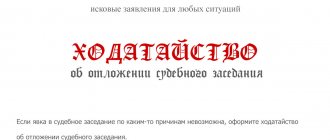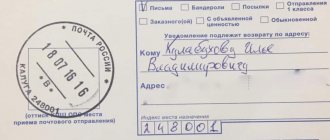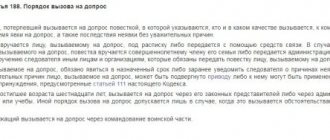Why do you need a motion to call witnesses? Is it necessary to declare it or can you do without it? Who are witnesses and why are they needed? Let's answer these and other questions.
A request to call witnesses must be made in order for them to be invited and heard in court. The court will not invite them on its own initiative. It is better to submit the petition in writing so as not to miss all the requirements that are provided for by the Code of Civil Procedure of the Russian Federation.
:
Petition to call witnesses
Who can be a witness in a civil case?
Testimony is an oral report by a witness about the facts known to him, which help to objectively make a decision in a given case. The testimony is recorded by the secretary in the minutes of the meeting.
According to Article 69 of the Code of Civil Procedure of the Russian Federation, any citizen who, for one reason or another, became aware of the circumstances of the case, can act as a witness. He undertakes to inform the court of all information known to him.
The following cannot act as witnesses:
- priests (according to information received at confession);
- court employees, jurors (according to information that became known during meetings on the case);
- defense representatives, mediators (for certain circumstances related to specific cases).
Witnesses may not testify against themselves or close relatives.
You shouldn't call a large number of people. Usually, one witness per specific circumstance that is of significant importance to the case is sufficient. But for reinsurance and better clarification, you can imagine two or three citizens.
It is worth considering that if a witness cannot come to the courtroom for good reasons (serious illness, old age, disability), then he is questioned by law enforcement officials at his place of residence.
About witnesses in the Code of Civil Procedure of the Russian Federation
Any citizen who is aware of the circumstances of the case, who may be an eyewitness to the event or who learned about the event from third parties, has the right to act as a witness in court. In the latter case, he is obliged to inform the court who and when told him this information. In the case of children and the incompetent, if they are unable to assess the consequences of their actions, their participation as a witness is prohibited.
Procedure for questioning witnesses
According to Article 177 of the Code of Civil Procedure of the Russian Federation, each witness is questioned separately. He can also be questioned through the use of video conferencing systems. The judge ascertains the witness’s relationship to the participants in the case and offers to provide the court with information about the circumstances of the case. If evidence is in doubt, litigants may ask questions. The person at whose request the witness was called, the representative of this person, and then the other participants and their representatives ask questions first. The judge has the right to ask questions to the witness at any time during his interrogation. If necessary, the court may re-examine the witness in the same or subsequent court hearings, as well as re-examine him to clarify contradictions in their testimony. An interrogated witness may leave the courtroom before the end of the trial if the court does not require his further participation.
Forms of false witness testimony
In accordance with the first part of Article 70 of the Code of Civil Procedure of the Russian Federation, a citizen who is summoned to court for questioning as a witness is obliged to appear and truthfully tell about the facts known to him. Personal presence in the courtroom is necessary so that the judge can look at the witness, evaluate his behavior and the veracity of his testimony. The person is also notified of criminal liability for giving false testimony. One must distinguish between perjury and delusion.
Perjury is the purposeful provision of false information. In this case, the witness can both distort some circumstances and speak generally fictitious facts, but do this consciously. Reasons for such behavior can include profit, revenge, disgust and fear. However, it is worth noting that perjury under the influence of threats is viewed from a different angle than for the sake of self-interest.
If a person reports information and does not realize that it is unreliable, then this is a misconception. It is very important that the witness be a person who is not interested in the court's verdict.
Is it possible to call witnesses without a petition?
Participants in a civil case can ensure the appearance of witnesses themselves, without prior notice to the court. However, to testify, you still need to make an oral or written request directly at the hearing. Until such a request is granted by the judge, the witness will be allowed into the hearing room. As with standard rules, the court must prove that the testimony will be relevant to the case. If the request is granted, the witness will be invited into the courtroom to provide explanations.
For any questions related to filing petitions and calling witnesses to court, you can get advice from our lawyers. We will explain the rules of law and judicial practice, and help you fill out the documents correctly. Contact us, we will find a way out even in the most difficult situation!
How to draw up a petition to call witnesses in a civil case
In accordance with Article 35 of the Code of Civil Procedure of the Russian Federation, citizens who participate in the process of considering the case can submit petitions. This type of application does not have a strict form or form, but it must contain some data.
The first thing you need to write is the full name of the court and who is filing the petition.
Then, in the body of the application, the civil case number is indicated and the contents are briefly described; information about the plaintiff and defendant is provided.
Next, it is necessary to provide the details of all witnesses whom, in the opinion of the applicant, the court should question. It is also necessary to provide facts or circumstances that this witness can confirm. Add date and signature.
The full name of the witness and residential address must be indicated. In no case should the document be compiled with grammatical errors, inaccuracies, corrections or incorrect wording. This may result in the application being rejected.
Consideration of an application for a writ petition
Like almost any petition by a party to a civil case, an application for a writ petition is considered at a court hearing, taking into account the opinions of the persons participating in the case. It is resolved by issuing a court ruling. If the petition is granted, the court has the right to suspend the proceedings in this civil case (which is usually done very reluctantly), and the ruling on the writ petition is sent to the addressee.
The court, which is entrusted with carrying out certain procedural actions, is obliged to complete them within a month. Such actions are also carried out at a court hearing and with notification of the persons involved in the case (their failure to appear does not affect the execution of the order). All evidence collected as a result of the execution of a letter of request is sent to the court that sent the letter of request. Which examines them according to general rules.
The law does not limit the repeated filing of a request for a writ petition, so the parties study and prove the need for such a procedure on their own.
Where and when to file a motion to call witnesses
The petition can be submitted to the court before the start of the trial and attached to the claim. You can submit an application to the court office or send it by mail. It is sent as a registered letter with a description of the attachment. In this case, the plaintiff will have confirmation that he went to court. If the applicant submits the application in person, then it is necessary to have a copy with him. This is necessary so that it is stamped, dated and signed by the person who accepted it.
You can also submit a petition directly at the hearing at any time. But before the trial itself, the judge always hears requests from people involved in the case. Be prepared for the fact that a verbal request must be confirmed with a written document. It is worth preparing as many copies of the application as there are persons involved in this case.
The best time to file a motion is when the case is preparing for hearing. This will give more confidence that the court will not reject it, since there will be enough time to find and call a witness for questioning. It is important to note that if the plaintiff makes a request during the trial, the judge will raise the issue for discussion between the parties. In this case, all participants in the process have the right to express their opinion about the possible interest of this witness, or incomplete awareness due to any circumstances; or they may provide other information that will cast doubt on the latter’s testimony.
Note!
- Issues of divorce and collection of child support are considered in two different trials. Therefore, it is advisable to file two claims in court. The claim for alimony will be considered by the court without delay, and the spouses will be divorced within 1 to 2 months.
- Cases regarding the collection of alimony are not classified as complex. You are quite capable of drawing up a statement of claim on your own, collecting the entire package of documents attached to it and personally submitting it to the court Read more>>
- We do not recommend using the services of sites that promise to remotely draw up a claim for money and file it in court without your participation.
- When collecting alimony in a fixed amount, or if the defendant has several sources of income, some of which he hides, the assistance of a qualified lawyer may be required. The participation of a lawyer in resolving such disputes is not necessary; a lawyer without a lawyer’s status can successfully represent your interests in court.
- Mandatory conditions when choosing a representative, a lawyer or lawyer, are his legal literacy, experience, impeccable reputation and specialization in conducting divorce cases.
In what form should I submit my application?
You can submit a separate application addressed to the judge, indicating the case number, which is not entirely convenient. If there are doubts about the impartiality of the representative of the authority, then the document should be submitted in advance through the office. Why? If the request is submitted orally, the only evidence of the request is the minutes of the court hearing. There may simply not be a note about the call in it. Thus, submitting a written application serves as a guaranteed means of recording your request.
And at the appeal stage, the judges will have no doubt that the declaring party really asked to call a witness in the civil process.
And further. If the clause about summoning was present in the application to the court, then you still need to voice your request to the court. This is due to the fact that one of the principles of civil procedure is orality.
Who invites him?
A witness in a civil trial is invited either by the plaintiff or the defendant. But not only. A third party has the right to invite him. Most often, participants in the meeting are invited by the parties.
The legislation gives the court the right to apply procedural coercive measures if a witness fails to appear: arrest, imposition of a fine. In fact, their appearance is ensured entirely by the person who asks to summon them. If the witness does not appear, the judge will inquire about the reasons and continue the process. In civil proceedings, the drive is not used in reality or is used extremely rarely in exceptional cases.
However, depending on the meaning of the testimony, the judge may postpone the case or be satisfied with the testimony of those who have already been questioned earlier.
It is also possible that after studying the already collected materials of the case and the explanations of the parties, the representative of the authority will not postpone the date of the hearing again in order to listen to the witness.
In the case of an appeal hearing, the judge’s refusal to postpone the consideration of the case because of a witness is recognized as legal, unless the reason for failure to appear is considered valid.
Legal refusal to testify
The law specifies a list of persons who cannot be interrogated or interrogation is permitted only if they consent.
The first group includes:
- persons who took part in the case as a representative or defense attorney in criminal proceedings;
- mediators who took part in the reconciliation procedure;
- judges, jurors - regarding issues that were discussed in the deliberation room;
- clergy about the information that became known to them during confession.
The ban operates regardless of the desire of the listed persons to tell the court anything.
Below is a list of those who can testify if they agree:
- deputies about information that became known to them in the course of performing their duties;
- Commissioner for Human Rights in the Russian Federation;
- Commissioner for the rights of entrepreneurs at both the federal and regional levels;
- man in relation to himself;
- spouse against spouse, parents against children, children against parents;
- adopted children and adoptive parents in relation to each other;
- brothers and sisters in relation to each other;
- grandparents and grandchildren in relation to each other.
Invitation procedure
One of the parties declares a desire to question the witness. The application indicates the information that this person can provide, his full details (full name, place of residence).
The petition for summons may be filed together with the claim or combined in one document. There are also nuances here.
If a request to call a witness in a civil proceeding is indicated in the claim, it is placed in the pleading part.
Evaluation of indications
Witness testimony can vary widely. There are two reasons for this: either a lie, or a person’s individual perception.
It should be noted that people are brought in only for knowingly false testimony. This means that the witness deliberately distorted real events in his story.
Most often, the testimony does not correspond to what happened due to a number of reasons: anxiety (not every day people come to court, where the atmosphere is not very pleasant), peculiarities of memory, and thinking. In addition, sometimes a lot of time passes between events and the court hearing.
Thus, the judge’s task is to find out how correctly a person perceives reality, whether his memory works well enough, and to what extent he correctly reproduces what he heard and saw.
In the absence of obvious lies in the testimony, the representative of the authority critically evaluates the testimony, motivating and justifying the reasons for its rejection.










